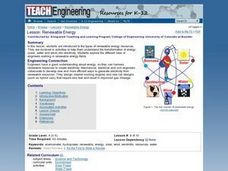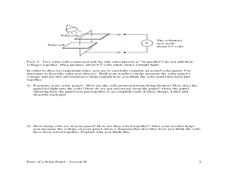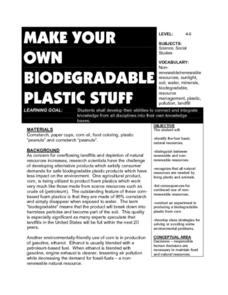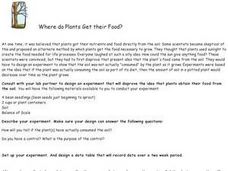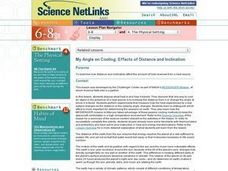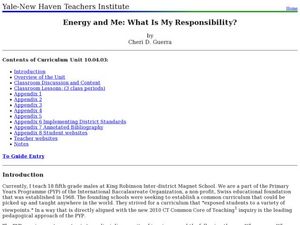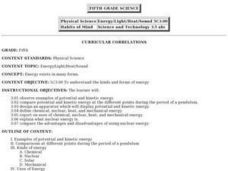Curated OER
Waste Watchers
Students recognize the importance of saving energy to save natural resources. In this saving energy lesson, students complete a worksheet to find types of electricity meters in their homes. Students use meter readings to calculate energy...
Curated OER
TE Lesson: Renewable Energy
Students examine renewable energy sources such as solar, water, and wind. They experiment to determine how renewable energy is transformed into electricity. They investigate the role of engineers who work in the field of renewable energy.
Curated OER
The Magic of Solar Thermal: How the Sun Can Be Used to Heat Water
Students are introduced to how the sun is used to heat water. In this solar lesson students identify the different types of solar water heating and demonstrate how it works.
Curated OER
Parts of a Solar Panel-Part II
Students discover how a mini-solar panel is constructed by behaving like detectives. Students examine an actual solar panel, measure the solar panel's voltage and use drawings to describe what they observe before completing questions...
Curated OER
Solar Arrays for the Space Station
Students explore the challenges that are faced when transporting materials into space. They review the various forms of energy, including solar arrays, that are used on the International Space Station and how generating this energy calls...
Curated OER
ENERGY, Design Competition: Energy Systems of the Future!
Students examine energy, where it comes from and the different fuels that are used. In this energy lesson students design an energy infrastructure using a renewable energy source.
Curated OER
Make Your Own Biodegradable Plastic Stuff
Students identify the four basic natural resources. They distinguish bettween renewable and non-renewable resources. Pupils recognize that all natural resources are needed by living plants and animals. Students list consequences for...
Curated OER
Leaves, the Sun, and the Water Cycle
As a way to combine life and physical science, or simply as an investigation of plant transpiration, this lesson is sure to inspire! Middle schoolers capture the moisture given off by plants that are placed in different conditions. They...
Curated OER
Where Do Plants Get Their Food?
Plants need food to survive, just like any other living organism. Young biologists analyze an experiment performed in 1610 by Jan van Helmont to determine if plant nutrition is obtained through the soil. First, lab groups work together...
Curated OER
My Angle on Cooling: Effects of Distance and Inclination
Students discuss what heat is and how it travels. They discover that one way to cool an object in the presence of a heat source is to increase the distance from it or change the angle at which it is faced.
Curated OER
Sun Friendly Homes
Young scholars design and build a model solar energy home. In this technology lesson plan, students test the efficiency of their model houses by measuring temperature at regular intervals. They analyze data and share results with the class.
Curated OER
Energy and Me: What is My Responsibility?
Students investigate energy and their impact on the environment. In this environmental lesson plan, students will conduct a series of three activities that will help in their understanding of energy and how we use it.
Curated OER
Desalination: Creating a Solar Still
To better understand how solar power can aid in creating desalinated drinking water, the class creates a model still. They will build a model of a solar still, make observations, and discuss how the process works. While the idea behind...
Virginia Department of Education
Go with the Flow
How does nature's hierarchy relate to our local human environment? Answer this question, along with others, as the class visually depicts the natural hierarchy provided by nature. Pupils discuss each piece of the pyramid and its energy...
Baylor College
Needs of Plants
What better way to learn about plant life than by creating a class garden? Young botanists start with a brief discussion about radishes before planting seeds and watching them grow. To determine the importance of water,...
Curated OER
Solar Lesson
First graders complete sunlight and solar effects activities to learn about light and its power. In this solar activity activity, 1st graders complete a sunscreen test activity, a light test, a black light test, a cloudy test, a...
Curated OER
Energy in a Clean Environment
Students identify and describe the different types of energy and how it is transferred. In this energy lesson students complete several activities including how to calculate joules, adding up wattage, and create a presentation on...
Curated OER
Applied Science - Built Environment (2) Pre Lab
Second graders review how our society affects nature. In this energy lesson, 2nd graders discuss the different ways that energy is collected. They review renewable and nonrenewable energy sources.
Curated OER
Energy, Light, Heat, and Sound
Fifth graders investigate various forms of energy. They compare potential and kinetic energy at different points during the period of a pendulum, design an apparatus that displays potential and kinetic energy, and analyze the advantages...
Curated OER
How Do Plants Grow?
Students investigate plant growth. In this plant growth lesson plan, students investigate what would happen to plants if they did not have water and sunlight. Students conduct experiments to determine what plants need. Students create a...
Curated OER
How do plant & animal cells make and use energy?
Middle schoolers show the relationship between the need for plants to undergo photosynthesis in order to generate oxygen. They see the flaws associated with this thinking because of the lack of CO2 and H2O and lack of sufficient gravity...
Curated OER
How Do We Explore Strange Environments?
Students identify and label the different parts of a robot, rover, or a spacecraft. They discuss and record all of the features their robot will need to accomplish its mission and be able to explain why they chose these features to...
Teach Engineering
Maximum Power Point
Investigate the maximum power output of a photovoltaic panel with a lesson that introduces the class to the maximum power point. Individuals learn how to determine the maximum power point of a solar panel by using Ohm's law and the power...
Teach Engineering
Ice, Ice, PV!
Knowing the temperature coefficient allows for the calculation of voltage output at any temperature. Groups conduct an experiment to determine the effects of temperature on the power output of a solar panel. The teams alter the...



